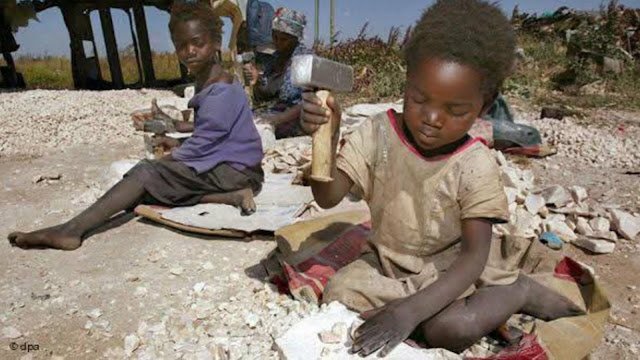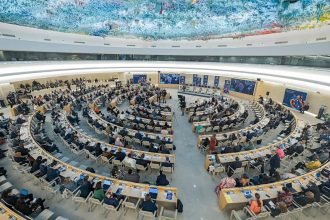The smartphones we rely on every day carry more than just advanced technology—they carry the untold stories of children whose lives are sacrificed in the name of progress. In the Democratic Republic of the Congo (DRC), modern-day slavery continues under the guise of mining. The shiny cobalt in your phone or electric car battery may have been mined by a child forced into labor.
The Forgotten Land of Riches
The Democratic Republic of the Congo is the second-largest country in Africa, home to more than 78 million people. A French-speaking nation with a deep history of colonization and civil unrest, Congo is rich in natural beauty and biodiversity. It is one of the rainiest countries in the world, second only to the Amazon rainforest in terms of coverage and ecological importance.
Despite its wealth of natural resources, the DRC remains one of the poorest nations in the world. Its soil holds an estimated $24 trillion worth of mineral resources including copper, cadmium, uranium, gold, tin, radium, and a wide variety of precious stones. But the most valuable among them is cobalt—a mineral essential to the production of lithium-ion batteries used in smartphones, laptops, and electric vehicles.
The Dark Side of Cobalt
Congo accounts for over 60% of the world’s cobalt production. This should, in theory, make the country wealthy and developed. Instead, it has made the country a target for exploitation. Large multinational corporations exploit the country’s weak governance and widespread poverty to extract cobalt at a fraction of its real value. The people, especially children, pay the ultimate price.
In 2014, a large cobalt reserve was discovered in the southern part of the country. Poor local communities began digging the ground by hand in search of this new treasure. What followed was a humanitarian disaster. Tunnels stretching over 100 feet deep were dug with no machinery, no safety measures, and no oversight. Most of these miners use nothing more than torchlights to see underground. As a result, many die from tunnel collapses or inhaling toxic gases. Some are buried alive—forgotten by the outside world.
Children in the Mines
Among the most heartbreaking realities is the widespread use of child labor in these dangerous mining sites. Children as young as five can be seen carrying heavy sacks of cobalt on their backs. Girls are often tasked with washing the ore—by hand, in contaminated water, and without protective gloves or masks. Exposure to cobalt dust leads to severe respiratory issues, heart problems, and even birth defects among newborns in mining communities.
It is estimated that over 10,000 people, including thousands of children, work in these mines under dire conditions. They are paid no more than one dollar a day. Despite the overwhelming evidence, major electronics manufacturers like Apple, Samsung, and Sony continue to deny the use of child labor in their supply chains. But investigations by NGOs and journalists tell a different story—one of systemic abuse and indifference.
Health Hazards and Long-Term Consequences
Cobalt is a toxic metal. Prolonged exposure to its dust can cause fatal health problems, including lung fibrosis and cardiomyopathy. Children working in the mines are particularly vulnerable because their bodies are still developing. Studies have shown that communities living near cobalt mines suffer from higher rates of birth defects, stunted growth, and chronic diseases.
In addition to physical ailments, there is also the psychological toll. These children grow up without education, stability, or hope. Many are orphans or come from extremely poor families that depend on their meager income for survival. What they lose in return is their childhood, their dreams, and sometimes their lives.
The Role of Global Corporations
Multinational companies benefit immensely from the cobalt supply chain in Congo, yet they do little to improve the lives of those who make it possible. Although many have released public statements claiming to source minerals responsibly, real transparency is often lacking. The complex network of middlemen, informal mines, and unregulated labor makes it easy to turn a blind eye.
Reports by organizations like Amnesty International and Human Rights Watch have repeatedly highlighted the involvement of child labor in cobalt mining. But without legal enforcement, corporate accountability, or consumer pressure, the situation remains unchanged.
The Price of Our Convenience
We live in a world where convenience is prized above all else. We upgrade our phones every year, buy the latest electric cars, and marvel at technological innovation. But rarely do we stop to think about the real cost behind these advancements. For every smartphone charged, a child may have worked a 12-hour day inhaling toxic dust in a Congolese mine.
We are all complicit in some way. And while it may not be realistic to stop using smartphones or laptops, we can start demanding better. Companies must be held accountable. They must implement transparent, ethical sourcing practices and invest in the communities they exploit. As consumers, we must ask questions, support ethical brands, and push for legislation that protects human rights.
Voices of Resistance
Despite the grim reality, there is hope. NGOs and activists are working tirelessly to bring global attention to the plight of Congolese miners. Organizations like Amnesty International have launched campaigns, filed lawsuits, and conducted undercover investigations to expose the truth.
Some companies are beginning to take steps toward ethical sourcing. But these efforts are not enough. What is needed is a global coalition of governments, corporations, and consumers willing to fight for justice. Without international pressure and policy reform, the cycle of exploitation will continue unchecked.
What Needs to Change
Ending child labor and human rights abuses in Congo’s cobalt mines requires a multi-faceted approach:
- Government Intervention: The Congolese government must strengthen labor laws and ensure their enforcement. Illegal mining must be shut down and replaced with regulated, safe practices.
- Corporate Responsibility: Tech companies must audit their supply chains and ensure no child labor is involved. They must also invest in alternative mining methods and community development.
- Consumer Awareness: Consumers must demand transparency and support ethical brands. Public pressure can drive corporate change.
- International Support: The United Nations and international human rights organizations must intervene to protect the rights of Congolese children and laborers.
A Call for Humanity
The situation in Congo is a moral crisis. No child should be forced to trade their health, education, and future for a mineral hidden in our gadgets. No parent should have to choose between starvation and sending their child into a deadly mine. The time for silence is over. The time for action is now.
Let us not look away. Let us recognize the hidden cost of our convenience and commit to building a world where technology doesn’t come at the price of human suffering. The children of Congo deserve our attention, our voice, and most importantly—our action.











